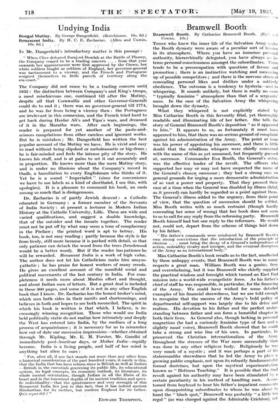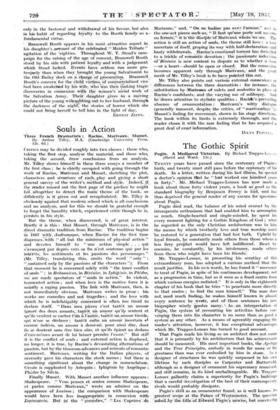. Bramwell Booth .
THOSE who knew the inner life of the Salvation Army under the Booth dynasty were aware of a peculiar sort of tension in its atmosphere. Where you have an immense personal
authority, hierarchically delegated, you have always au in- tense personal consciousness amongst the subordinates. There tends to be a - preoccupation with questions of favour and promotion ; there is an instinctive watching and measuring up of possible competitors ; and there is the nervous strain of concealing personal likes and dislikes under a soldierly obedience. The outcome is a tendency to hysteria—and to whispering, It sounds unlikely, but there is really no more " typically feminine " atmosphere than that of a sergeants' mess. In the case of the Salvation Army the whispering brought down the dynasty.
What they whispered is not explicitly stated by Miss Catharine Booth in this fervently filial, yet thoroughly readable and illuminating life' of her father. She tells the
story of General Bramwell Booth's deposition " as it appeared to him." It appears to us, as fortunately it must have appeared to him, that there was no serious ground of complaint
against his administration of the Army. The point at issue was his power of appointing his successor, and there is little doubt that the rebellious whispers were chiefly concerned with the name of this as yet unnamed, but frequently guessed at, successor. Commander Eva Booth, the General's sister, was the effective leader of the revolt. The officers who supported her may or may not have suspected the name of the General's chosen successor ; they had a strong case on general grounds for urging a more democratic administration of so vast a power and property. That they pressed their case at a time when the General was disabled by. illness (fatal, as it proved) can hardly be regarded as a point against them. The General's illness added to the urgency, from their point of view, that the question of succession should be settled. Miss Booth writes with so much restraint (though hardly concealing her sense of wrong) that her book does not seem to us to call for any reply from the reforming party. Bramwell Booth himself had but one reply to the reformers. He would not, could not, depart from the scheme of things laid down by his father.
" His father's commands were reinforced by Bramwell Booth's own strong convictions that the introduction of the principle of election . . . must bring the decay of a General's independence of action, unhealthy rivalry and intrigue, and the eventual disruption of the Army as an international body."
Miss Catharine Booth's book recalls us to the fact, unaffected by these unhappy events, that Bramwell Booth was in many respects a great man. William Booth was a genius, fiery and overwhelming, but it was Bramwell who chiefly supplied the practical wisdom and foresight which turned an East End mission into a world-wide evangelistic force. As his father's chief of staff he was responsible, in particular, for the financing of the Army. We could have wished for some detailed examples of his financial shrewdness, but we are told enough to recognize that the success of the Army's bold policy of departmental self-sppport was largely due to his ilriVe and realism. His devotion to his father and the perfect under- standing between father and son form a beautiful chapter in both their lives. As General also, though lacking in personal magnetism (he had a curiously feminine type of face and a slightly nasal voice), Bramwell Booth showed that he could take a strong and wise line of his own. In particular, he preserved the Christian internationalism of the Army throughout the stresses of the War more successfully than
was done in any other religious body. Religiously he was very much of a mystic ; and it was perhaps a part of his statesmanlike shrewdness that he led the Army to place a
growing public emphasis, not upon its robustly fundamentalist formal doctrines, but upon the mystical experimentalism known as " Holiness Teaching." It is possible that the final
revolt against his authority may have been stimulated by a certain peculiarity 'in his method of handling men. Accus-
tomed from boyhood to hear his father's impatient comments upon disappointing subordinates to whom he was about to hand the " black spot," Bramwell was probably " a little too regal " (as was charged against the Xdmirable Crichton), not only in the bestowal and withdrawal of his favour, but also in his habit of regarding loyalty - to the Booth family-as a fundamental virtue.
- Bramwell Bcioth appears in his 'unit- attraetive aspect in his daughter's aiebount of the celebrated " Maiden Tribute " agitation of the 'eighties. Throughout W. T. Stead's- cam- paign for the raising of the age of consent, Bramwell Booth staid by his side with patient loyalty and with a judgement which Stead lacked. Events have seldom run more gro- tescjaely than when they brought the young Salvationist to the Old Bailey -dock on a charge of procuration. Bramwell. Booth's concern. for the child. victims of commercialized vice had been awakened by his wife, who Was then Making tragic discoveries in cOanexion- with the Womea'S social wary of the. Salvation Army. Their dinghter_ gives its a nfo3iing,, picture of the youngwifavhbing out to_ er husband, through" the darkness of the night'; the stories of horror which she could not bring herself to tell him in 'the light of day.
ERNEST JEFFS.. .















































 Previous page
Previous page